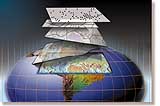 ANALYTICAL
AND COMPUTER CARTOGRAPHY: Spring 1999
ANALYTICAL
AND COMPUTER CARTOGRAPHY: Spring 1999
TECHNICAL TIPS FOR CONVERTING AND USING
GEOGRAPHIC DATA IN ARCVIEW© AND ARC/INFO©
RETRIEVING,
CONVERTING AND IMPORTING USGS DEMS IN SDTS FORMAT
Get the windows program
to convert DEMs in SDTS format to USGS DEM format. Do
this once only - this program coverts the spatial data transfer standard format
to DEM format.
- Click here to download the program
in WinZip compressed (sdts2dem.zip
- includes readme file) or non-compressed (sdts2dem.exe
and readme.txt)
format.
- Save to disk (put wherever your
downloaded DEMS will reside).
- If you downloaded the zipped file, go
to Start/Programs/WinZip. If
you don't have WinZip, you can download an evaluation version from the
web at www.winzip.com/ddchome.htm.
- Open windows explorer or NT explorer
or My Computer (however you are used to looking at your files from a window
standpoint).
- Click through subdirectories until
you get to the folder that holds your sdts2dem.zip file just downloaded.
- Drag your sdts2dem.zip file into
the winzip window.
- Drag the files in the winzip window
back to the folder from whence they came (back to where the sdts2dem.zip
file is).
- You should now have a program called
sdts2dem.exe and a readme file in the same directory with sdts2dem.zip.
Get the DEM data you want.
- Go to the USGS web page and get
the DEMs you want. There are several ways to do this. The example given
here leads to a link to DEMs
in alphabetical order. You can also access DEMs by state and by map
graphics.
- You have options for different
DEM resolutions (how closely points are sampled). The rest of this example
pertains to the retrieval of 7.5' quadrangles. This process should be
similar for files of other DEM resolution.
- Click 7.5min
- Click the letter that matches the
first letter in the NAME of the quadrangle you seek.
- Click the name of the quadrangle.
- Your URL may look something like
this: http://edcwww.cr.usgs.gov/pub/data/DEM/7.5min/flagstaff_west_AZ
- Select the actual DEM file, which
is some combination of numbers and alpha characters, ending with a .tar.gz.
In this case it is called 30.1.1.1201606.tar.gz. Tar is a tape archive,
a way to put a group of files into one file. GZ is the extension added
to the file when it was gzipped (a compression technique).
- After you click on the .gz file,
a window will pop up asking where you want to save the file. The default
file name will not help you identify the file later, so change the name
to something recognizable. Also, some browsers change the downloaded name.
In this case, substitute a .(dot) for the _(underscore) before tar in
the filename (instead of _tar at the end, make it .tar) and add a .gz
extension. In this case I might rename 30.1.1.1201606_tar (as shown in
the Save As:Filename box) to flgw.tar.gz
- Repeat these steps with all of
the DEMS you want.
Convert the DEMS
- From SDTS format to USGS DEM format
- Uncompress the DEMS
- Go to Start/Programs/WinZip
(if you don't have it, you can download it free from the web).
- Open windows explorer or NT
explorer or My Computer (however you are used to looking at your files
from a window standpoint).
- Click through subdirectories
until you get to the folder that holds your DEMs.
- Drag your DEM to the winzip
window.
- Drag the files in the winzip
window back to the folder from whence they came (back to where the
dem.tar.gz file is).
- You will see a bunch of files
that start with the same 4 numbers and have a ddf extension. All these
files together make one DEM.
- Run the SDTS2DEM .exe program
- In your folder find the command
called sdts2dem, with a command icon.
- Double-click it to run the
program.
- A menu pops up.
- Choose Select Input
- Click on any of the files that
start with the same 4 number header and a ddf extension.
- Click on Select Output
- Name the output dem something
recognizable, like flgw (the dem extension will be added by the program).
- Remove all the files associated
with this DEM before you begin to convert the next one.
- Convert all DEMs now.
- USGSDEM format to an ArcView Shapefile
- Start AV
- Go to File/Extensions
- Be sure Spatial Analyst is checked.
- Click OK.
- Open or highlight an existing
View, or open a new View. Be sure a view window is active.
- Click File/Import Data Source
- Pick USGS DEM from the Select
File Import Type pull-down.
- When the Import USGS DEM files
window pops up, find your converted dem(s), highlight and click OK.
The files you bring in here are the ones ending in DEM that resulted
from running the SDTS2DEM.exe program.
- Add the resulting shapefile to
your view if you want.
- USGSDEM format to an Arc/Info Grid
- Use the Arc command DEMLATTICE,
entering the output the DEM conversion steps (*.dem) at the input
dems. The command usage looks something like this:
- Arc: DEMLATTICE flgw.dem flgwgrd
- The type is USGS (default).
You're done!
 Back
to instructor's home page
Back
to instructor's home page